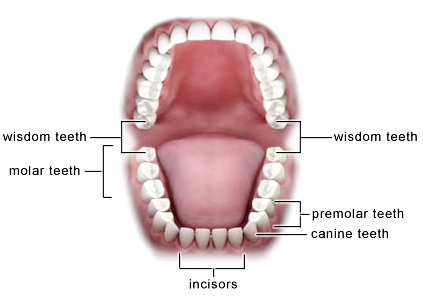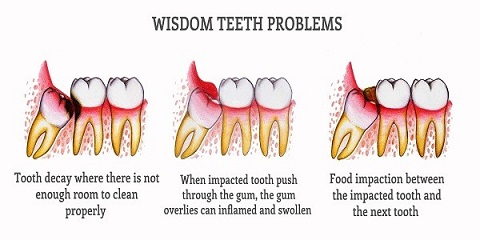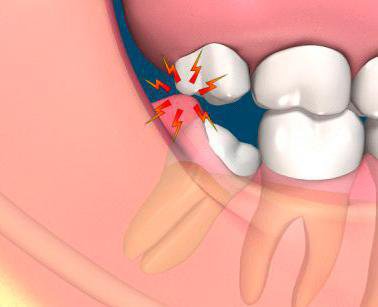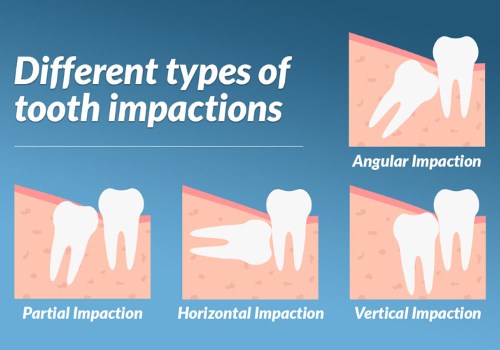Wisdom teeth are the final set of molars which to form. The name comes from the fact that, if there is enough room for them, they poke through the gum (erupt) around 16-20 years old. At that age, the adage is one is has lived enough to be ‘wise.’ You can decide for yourself if you find this to be true!
Not all wisdom teeth need removal. We take an evidence-based approach and only remove those which present a clear indication for treatment. Dr. Hawryluk has removed thousands of impacted wisdom teeth and would like to help you make informed decisions about your dental health.

Wisdom teeth are considered ‘vestigial’ structures. That is, they are evolutionary ‘left-overs’ which are no longer of great function. They will probably phase-out of the human gene pool over the next several millennia (hopefully we last that long!). Other examples of vestigial structures are human appendix and a whale’s thigh bone. Anthropology has shown us that long ago, human jaws used to be bigger, and our diet was different. Wisdom teeth were much more functional at that time as they erupted fully into the mouth and were used to chew (masticate) tougher foods than we typically have in our diet today. Currently, our jaws are not often big enough to accommodate wisdom teeth and can lead to several different issues.
Some wisdom teeth may never need removal. If the wisdom tooth is entirely housed in bone (fully impacted tooth) and has no sign of pathology either clinically or radiographically, then there is a good chance this tooth will be fine in the long run. Similarly, a wisdom tooth may never need removal if it has fully broken through the gum, has no decay, and is cleanable.
Sometimes wisdom teeth can be problematic due to dental decay. Even if our jaws are big enough to accommodate them, they can have a higher decay rate due to there being more difficulty in accessing them when brushing. If Dr. Hawryluk does spot softening of these erupted teeth at an early stage, he will inform you and discuss ways of preventing further decay. Also, if warranted, the existing decay could be removed and filled with modern filling materials such as composite resin.
One common reason for pain or swelling around wisdom teeth is pericoronitis – inflammation and infection of the gum around the wisdom teeth. Usually, this happens when a wisdom tooth has grown in halfway, and the gum only partially covers the area. In this situation, debris can get trapped between the gum and the tooth, causing pain and inflammation. Dr.Hawryluk will assess whether it is prudent to consider the removal of the tooth.
In some cases, wisdom teeth are removed at a young age (16-22 years) even if they are not causing an issue–this is practice seems to be more common in North America compared to Europe. The rationale here is that some teeth have a high probability of having complications later on in life and are much simpler to remove at a young age. Youth and more straightforward surgery also mean fewer complications in the post-surgical period. At a young age (16-22 years), wisdom teeth easier to remove because a dental follicle is around the tooth, which makes more room for the clinician to remove it. Also, the ligaments holding the tooth to the bone can be larger, allowing for much more ‘give’ to the tooth when the clinician applies removal pressure. Another primary consideration for removing wisdom teeth in young adults is the position of the tooth relative to the nerve canal (inferior alveolar nerve). At a young age, the wisdom tooth root may not be fully formed and sit well above the nerve canal. However, over time the root will develop and often transect the nerve canal. Hence, removing at a young age may considerably lessen the chance of any nerve damage (paresthesia).
In rare cases, cysts or tumors can form around wisdom teeth. Sometimes patients have no symptoms at all, and they can grow undetected if the patient forgoes appropriate routine radiographic screenings. If the cyst enlarges, they can lead to jaw fracture due to the cyst causing jaw resorption. St. Lawrence Dentistry always advises patients to have the appropriate screenings to prevent these situations and will deal with scenarios like this in an urgent fashion.
Finally, a consideration for wisdom teeth removal is if their presence is causing dental decay in the adjacent second molars. Wisdom teeth, which are in a ‘meso angular’ orientation, can push on the roots of the second molars and cause bone loss in the area. If saliva seeps into the area of the bone loss and it cannot be cleanable, this often leads to decay. Since the decay happens on the root of the second molar (and not on the crown), it can be difficult to fix by a simple filling alone, and often a root canal and crown could be indicated. However, if treatment of the decay and removal of the offending wisdom tooth is at an early stage, and then caries on the second molar can sometimes be treated by a simple filling.
As you can see, there are many factors to consider when assessing wisdom teeth. St Lawrence Dentistry will make an accurate diagnosis of your specific situation and help you make informed decisions. We offer awake and asleep options to remove wisdom teeth. A Board Certified Medical Anesthesiologist offers sedation at our facility, and we are fully certified by the Royal College of Dental Surgeons to provide Dentistry Asleep (Dental Sedation).
If you have any questions about your wisdom teeth and you live in the Mississauga, Oakville, or Toronto area, please call us.







